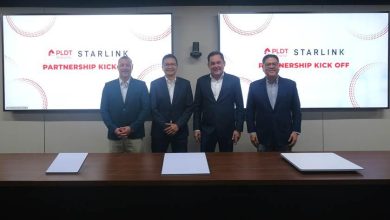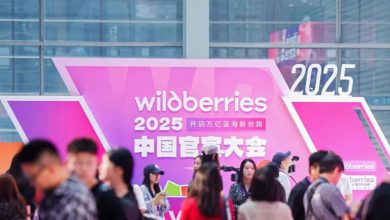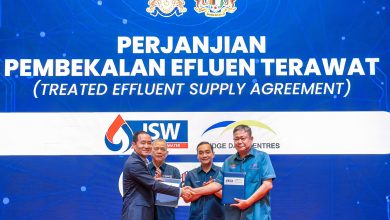Huawei Concludes 2024 Global Talent Development Forum, Focusing on Talent Empowerment for Industrial Intelligence
7th Global Talent Development Forum Empowers Talent and Amplifies Intelligence
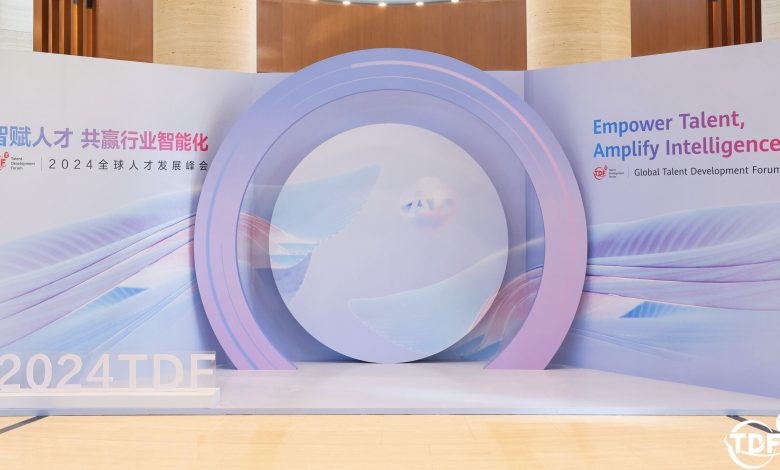
Huawei recently wrapped up its 7th Global Talent Development Forum (TDF) in Shenzhen from 24 to 25 October. Themed “Empower Talent, Amplify Intelligence,” this year’s forum convened over 100 leaders from industry organizations around the world. Also in attendance were industry thought leaders and experts from Mercer, The Adecco Group, ESCP Business School, and CAICT, who delved into future ICT trends, best practices in talent development, and strategies for cultivating digital talent essential for the digital transformation of the industry.
The event commenced with an insightful address from Jason Liu, President of Huawei Learning & Certification Services Department, who emphasised the transformative impact of a fully intelligent era on talent empowerment.
“The target, content, and mode of empowerment are all changing,” he said. “The target has shifted from ‘human’ to ‘human + AI’; the content now centers the integration of industry and technology, which is crucial for digital transformation; and the mode should encompass personalized learning and on-demand access to accurate knowledge.”
To this end, he outlined Huawei’s commitment to collaborating with customers and partners to cultivate and transform talent within enterprises, foster industry-academia collaboration for digital talent development, and empower ICT professionals through Huawei certifications spanning 23 subject areas.
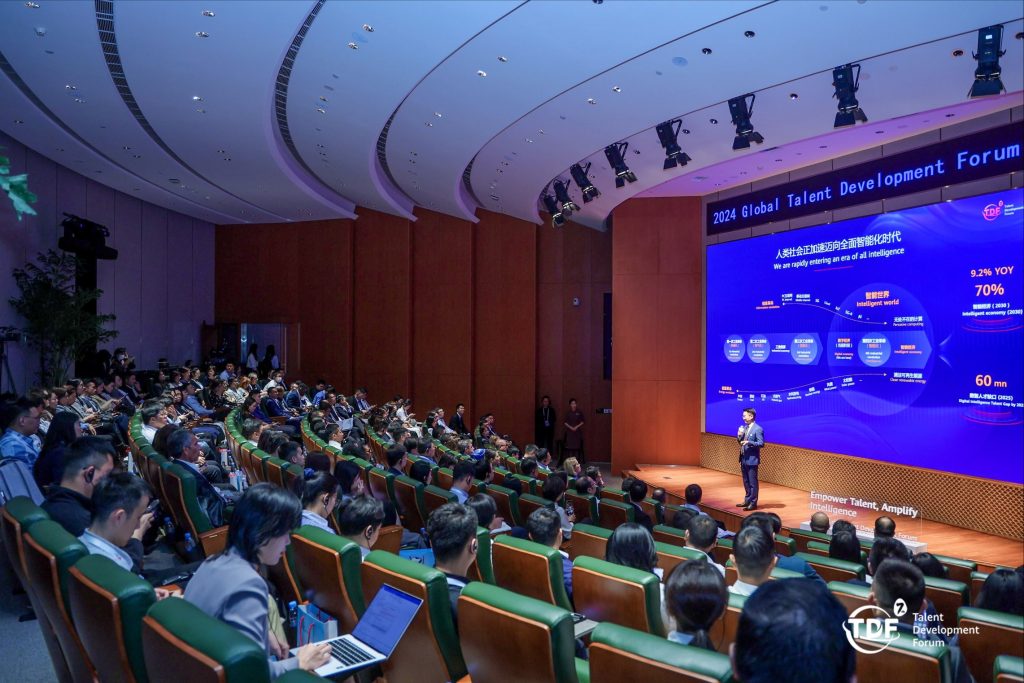
Global Insights: Navigating the Changing Digital Talent Landscape
Setting the stage for discussions on the ever-evolving talent landscape, Hui Tao, Director of Huawei ICT Industry Strategy Planning and Development Department, shared insights from Huawei’s Intelligent World 2030 report. He highlighted the growing demand for improved quality of life, renewable energy, automation of repetitive and dangerous tasks, as well as secure and reliable digital services. “By 2030, we predict that every 10,000 workers will work with 1,000 robots, Virtual Reality/Augmented Reality (VR/AR) users will reach 1 million, and enterprises will build dedicated 5G-A networks,” he said, urging collective action towards an intelligent world of the future.
Global experts weighed in on the challenges and opportunities presented by today’s digital world. Peta Latimer, President of Mercer Asia, stressed the need for resilient organisational structures and digitally centric corporate cultures to navigate societal shifts and technological advancements. She noted, “The integration of AI will unlock new pathways for realizing talent potential.”
On the power of AI, Caroline Styr, Head of Thought Leadership Research at The Adecco Group, said, “AI is significantly increasing productivity and improving efficiency. Technical talent has therefore become a core driving force for enterprise development. Investments in training can strengthen employees’ technical confidence, ensuring that businesses can successfully adapt to the rapidly changing market environment.”
Practical Applications: Sharing Best Practices in Talent Development with Huawei
Building on the insights into the future talent landscape, Ms. Véronique Tran, Executive Vice President for Executive Education and Corporate Relations Professor of Organisational Behaviour at ESCP Business School, underscored the importance of the transformation of each individual within organisations. ”
Talent is the key to companies gaining a competitive edge during the transformation process,” she stated. “Only by effectively integrating all aspects within the enterprise can a long-term business strategy be achieved and sustainable development realised.”
Junwei Li, Huawei’s Deputy Chief of Strategic Reserve and Director of Leadership & Human Resource Dept, emphasised the critical role of talent in overcoming business challenges.
“The answer to the dilemma faced by enterprises in achieving continuous profitability and development still lies in the people,” he said. “At this historical turning point, our strategy at Huawei should focus on the company’s business strategy, concentrate on exploring and achieving breakthroughs in capabilities and opportunities, and nurture high-potential talent for future success.”
The forum spotlighted practical insights from various organisations successfully navigating digital transformation in talent development and management.
“In view of emerging trends such as big data, cybersecurity, and AI, we are launching corresponding training programs to help individuals and organisations adapt to these changes and maintain competitiveness,” said Ahmed Almadani, Talent Development Director at Zain Saudi Arabia.
Baoshu Liu, Senior Economist of China Petroleum and Chemical Corporation, introduced the company’s 7-2-1 principle in developing managerial, application-oriented, and specialised technical talent amidst digital transformation.
“70% of capability improvement comes from practical experience, 20% from guidance and feedback from others, and the remaining 10% from learning and training,” he stated.
Meanwhile, Kam-Shing Fung, Vice President of Digital Transformationat HKT, shared the company’s experience using the Digital Talent Mature Model to align business objectives with talent management.
He said, “By employing a common language for talent development management, we facilitate continuous learning and improvement, constantly enhancing our engineers’ skills to keep pace with digital technology.”
In welcoming the era where AI applications are empowering all industries, Yunfa Liao, President of the CAICT East China Branch, called for the need for professionals with expertise in both intelligent computing and industry-specific knowledge.
“This composite talent is crucial to amplifying the positive impact of large models and intelligent computing, accelerating the development of new productive forces, and driving high-quality development across sectors,” he pointed out.
The forum also saw the launch of the Digital Talent Mature Model (DTMM) 2.0, inviting customers and partners to jointly contribute to its innovation and enhance its application for optimised digital talent development in the dawn of industrial intelligentisation.
Shared Wisdom: Realising the Role of Human Resources in Digital Transformation
As part of the event, a Global CHRO Roundtable was held to explore how human resources (HR) can support digital transformation and enterprise innovation, featuring practical sharing and interactive talks on key HR priorities.
Dr Margaret Hu, Senior Consultant in the ICT strategy and marketing domain, underlined the pervasive nature of digital transformation that is beyond individual enterprises.
“It is a profound, all-encompassing transformation that impacts everything from nations and cities to industries, from businesses to individuals,” she commented. “We need to build crucial digital capabilities to effectively address the key challenges brought on by this transformation.
On the role of HR in digital transformation, Li Han, Director of Huawei’s Centre of Strategic Transformation Resources, emphasised, “Every aspect concerning people matters; without their full understanding and support, digital transformation is often difficult to achieve. Whether HR can competently demonstrate its value is a decisive factor in the success of digital transformation.”
Yongfang Sun, Huawei Top Mind Mentor of the 2012 Laboratories, discussed how to unleash the power of top talent in driving enterprise technological innovation.
“They must broaden their horizons, gain a deep understanding of the strategic needs of the business, and learn to effectively manage the relationship between technology and commerce,” he said. “Enterprises should also establish operational support mechanisms to safeguard and empower top talent.”
Commenting on the tenets of successful digital transformation, Dr Rumeysa Kaymakcı, Director at Turkcell Academy, stressed, “Only by integrating technology, corporate culture, and leadership can be achieve success. HR dashboards help enhance productivity and employee capabilities, ensuring the future growth and prosperity of the company.”
Experiential Learning: Understanding Intelligent Computing and Large Models
The two-day event concluded with an experiential training session on the technological lineage of intelligent computing and large models. Led by Hai Yan, Senior Consultant at Huawei, the session showcased the latest trends and innovative AI applications from leading global enterprises, providing customers with a comprehensive understanding of the development of these important subject matters.
Through the 2024 TDF, Huawei reinforced its commitment to empowering talent and driving industry intelligentisation by advocating openness, sharing, contribution, and action. The event provided a valuable platform for collaboration and the exchange of ideas in addressing the challenges of global ICT talent development among carriers, government and enterprise CHROs, HR directors, and other customers. With Huawei’s talent development service solutions, attendees are empowered to unlock the potential of the next generation of digital talent, explore the best path in talent development, and achieve win-win in their digital transformation journey.


